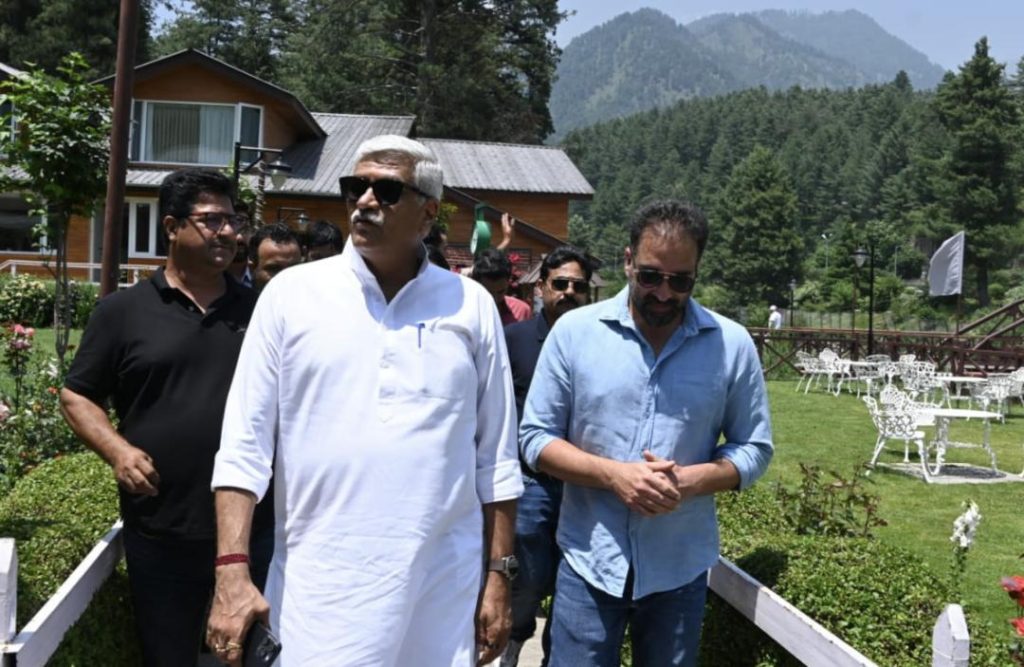
J&K will once again see a surge of tourists: Tourism Minister
The Union Culture and Tourism Minister, Gajendra Singh Shekhawat, has expressed confidence that Jammu and Kashmir will once again experience a surge in tourist arrivals. Shekhawat made this statement while on a two-day visit to the region, following a recent terrorist attack in Pahalgam that had badly hit the tourism industry.
According to reports, the Pahalgam terrorist attack had led to a significant decline in tourist inflow to the region. However, with the efforts of the Centre and the Jammu and Kashmir government, tourism activities have started to pick up pace again. Shekhawat’s statement is a welcome sign for the tourism industry in the region, which has been facing significant challenges in recent times.
The tourism industry in Jammu and Kashmir has been a significant contributor to the region’s economy, with millions of tourists visiting the region every year. The region’s natural beauty, including its snow-capped mountains, lush green valleys, and beautiful lakes, attracts tourists from all over the world. However, the recent terrorist attacks in the region have led to a decline in tourist arrivals, leading to significant financial losses for the tourism industry.
Shekhawat’s statement is a clear indication that the Centre and the Jammu and Kashmir government are working together to revive the tourism industry in the region. The Minister’s visit to the region is a significant step in this direction, as it highlights the Centre’s commitment to the development of the region and its people.
During his visit, Shekhawat met with various stakeholders in the tourism industry, including hoteliers, travel agents, and tour operators. He also visited various tourist destinations in the region, including Pahalgam, Gulmarg, and Srinagar. The Minister’s visit is expected to boost the morale of the tourism industry in the region, which has been facing significant challenges in recent times.
The tourism industry in Jammu and Kashmir is facing significant challenges, including the impact of the COVID-19 pandemic, economic uncertainty, and political instability. The recent terrorist attacks in the region have also led to a decline in tourist arrivals, leading to significant financial losses for the industry.
However, despite these challenges, the tourism industry in Jammu and Kashmir is showing signs of resilience. The region’s natural beauty, including its snow-capped mountains, lush green valleys, and beautiful lakes, continues to attract tourists from all over the world. The region’s rich cultural heritage, including its history, art, and cuisine, is also a major draw for tourists.
In recent times, the Jammu and Kashmir government has taken several steps to revive the tourism industry in the region. These steps include the launch of various tourism-related initiatives, including the development of new tourist infrastructure, the promotion of local culture and heritage, and the provision of financial support to tourism-related businesses.
The Centre has also taken several steps to support the tourism industry in Jammu and Kashmir. These steps include the provision of financial support to tourism-related businesses, the launch of various tourism-related initiatives, and the development of new tourist infrastructure.
Shekhawat’s statement is a welcome sign for the tourism industry in Jammu and Kashmir, which is expected to benefit from the efforts of the Centre and the Jammu and Kashmir government. The Minister’s visit to the region is a clear indication that the Centre is committed to the development of the region and its people.
In conclusion, the statement by Union Culture and Tourism Minister Gajendra Singh Shekhawat that Jammu and Kashmir will once again see a surge in tourist arrivals is a welcome sign for the tourism industry in the region. The Centre and the Jammu and Kashmir government are working together to revive the tourism industry in the region, which is expected to benefit from the efforts of both governments.
The tourism industry in Jammu and Kashmir is facing significant challenges, including the impact of the COVID-19 pandemic, economic uncertainty, and political instability. However, despite these challenges, the industry is showing signs of resilience, and the region’s natural beauty, cultural heritage, and rich history continue to attract tourists from all over the world.






